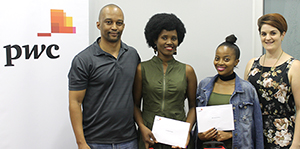
From the left are: Cassius Coetzee, Marketing
Manager at PwC, Mbalentle Mdange and
Clementine Molaeng, both accounting students
at the UFS, and Belinda Janeke from the Career
Development Office at the UFS.
Photo: Siobhan Canavan
Corporate Bloemfontein has made it its mission to invest in the potential of students, which is exactly what PricewaterhouseCoopers (PwC) set out to do with its competition for accounting students.
PwC to join UFS Career Fair in 2017
The Career Development Office at the University of the Free State (UFS), in partnership with PwC, held a competition in which students had the opportunity to win book vouchers.
Cassius Coetzee, marketing manager at PwC, did the handover at the UFS which saw Mbalentle Mdange and Clementine Molaeng each walk away with book vouchers to the value of R1500, as well as goodie bags from the Career Development Office.
Belinda Janeke from the Career Development Office said it was always a pleasure working with the PwC team and said they would be joining the UFS Career Fair later this year.
Corporate companies and the community
Vicky Simpson, from the Department of Institutional Advancement, said there were businesses and organisations that believed in making a difference in the lives of students. “We commend each of them for their passion and enthusiasm. Collaboration is the key to the success of our community. People matter to us and even more so, the important role we play within our community.”